- Home
- Gary Vaynerchuk
Crushing It! EPB Page 8
Crushing It! EPB Read online
Page 8
At the end of 2015, DRock, my videographer, started following me around with a video camera everywhere I went during work hours. The only time the camera was turned off was during sensitive meetings or when I went to the bathroom. I wanted people to see what hustle really looked like, how I could squeeze so much productivity into every minute (and incidentally, to prove that even when you’ve “made it” and are “important,” you don’t have to act like an arrogant jerk to the people you interact with on a day-to-day basis, especially those working in service jobs). It was important to me to address a frequent speculation I was seeing in my feeds, which was that I was exaggerating how many hours I worked per day. I wanted people to see that when I said I worked from about six a.m. to ten p.m. Monday through Friday, I was serious. Moreover, I have been working those hours for about a decade.
Most important, however, I wanted to provide a learning tool for the kind of people built like me. I learn by watching and doing, not by reading. It’s not uncommon for me to get a message from someone who tells me that they picked up something valuable from watching me interact with people on-screen or from a random rant that I offered from the back of the car. In most cases, I’m almost positive that that moment meant nothing to anyone else, but to hear that on that day I was able to help one person means the world to me. I can’t take a meeting with every person who wants my advice, but I can teach by example and let them learn from that. None of us can predict with utmost certainty exactly what’s going to happen to us. We will probably meet the people we arrange to meet, but we could also have random encounters. We will probably have the conversations we have scheduled, but who knows where those talks might go? Documenting guarantees that every encounter and every engagement is captured so I can ensure that I’m never caught off guard when I experience a moment that could spark a valuable piece of content for my followers. Documenting has liberated me from the pressure of having to create all the time.
Use Snapchat, Instagram Stories, YouTube videos, and Facebook Live three, four, five times per day to share the world through your eyes. Let your audience meet your cranky uncle, let them see what you’re eating for lunch, let them follow you as you slog through the workout you love to hate. Invite them in when you move into your first postdivorce apartment or your college dorm. Take them along on your vacations and business trips. Think of yourself as the star of this show and the production company.
Is everything about your daily life inherently interesting and new? In the right hands, yes. It’s not easy to make a personal documentary, but it’s a hell of a lot easier than trying to produce Modern Family. And which do you think you’ll get done faster? What’s the cost? It’s worth a try. Maybe you’ll hate it (it took me several months to get used to having a camera follow me wherever I went), and maybe you’ll fail. But maybe you’ll build the audience that earns you $80K a year, or $380K, which can come through the ads, affiliates, speaking engagements, books, sponsorship deals, and other ancillary revenue-earning opportunities that come from having a strong personal brand. You never know what you’re going to put out that inspires someone important to reach out to you. People who see your work will come to you with ideas and offers and partnerships. They will buy into you if you give them the right story. At the very least, even if you don’t become the next Kardashian, you’ll likely find that you can healthily supplement your current income doing something that you find interesting and fun.
Documenting to build a personal brand is an especially good tactic if you’re already working a job that you want to leave someday. Build your brand and gain traction in your niche before you ever need to make any money, so that when you are ready to step out of your current job, your brand is there to hold you up and carry you to your next opportunity.
Now, this tactic solves only one hurdle: how to build cred when you have none yet. However, it cannot help you if your content sucks. Sorry, there’s no skirting the fact that any success you achieve will be predicated on the quality of your content. Don’t think you can put out mediocre videos and blogs and get anything but mediocre results, just as you can’t think that putting out a half-assed effort will get you even halfway to where you want to go. That said, just because you suck now doesn’t mean you’re always going to suck. Many of the entrepreneurs we spoke to didn’t know what they were doing when they first started vlogging or podcasting either, and it showed. But they worked at it every day, analyzing their content, engaging with audiences to see what resonated and what didn’t, and studying other personal brands to see what strategies they could adapt for themselves. They practiced their craft as intensely and methodically as a surgical resident practices her stitches or a preprofessional basketball player practices his layups.
Documenting will keep you honest. It makes me laugh when I see nineteen-year-olds and fresh college grads anoint themselves on Instagram profiles as “entrepreneur experts,” or “social-media life coaches.” Like hell they are. Very, very few have earned the right to those titles. Young girls will put up profiles announcing that they’re beauty experts. No, they’re beauty opinionators. You don’t get to call yourself an expert until you’ve put in the work—and the market decides, not you. When I was a kid, I would sit next to my dad in the car and tell him that I was going to be a wine expert and build the biggest liquor store in the country. I couldn’t drink, so I spent all the years until my twenty-first birthday tasting all the things critics and wine labels said wine tasted like—grass, dirt, cherries, tobacco—to develop my palate while I learned the business. It was only when I was of age and sure I had something of real, unique value to offer customers that I went public and started building a brand around my expertise. I was thirty years old and had been in the business of tasting hundreds of wines per week for a decade.
If I could give some advice to my seventeen-year-old self, I’d tell him to turn on the camcorder and capture every minute of his training. How fantastic would it be to be able to share with people the first time I tasted dirt? I could have filmed myself tasting thirty-five different Merlots and telling the audience, “Someday I’m going to be able to tell you which is which while blindfolded,” and then three years later I could have filmed myself blind taste-testing a row of red wines and correctly identifying those Merlots. And then I could have created some content that juxtaposed those two videos and showed the world how far I had come. It would have been honest, and it would have been great storytelling. At twenty-six I was going to be who I am today; it’s a shame the whole process of getting here has been lost to history. Sure, I tell my story in books and during keynotes, but imagine the detailed lessons I could have shared, the mistakes people could have watched me make, the learning curve I could have provided, if only I had thought to document my life in the moment. The beauty expert wannabes could do the same thing. Instead of going to the department store, getting makeup advice from the reps at the cosmetics counter, and then filming themselves regurgitating the information as though it were their own, they could film themselves asking questions at the makeup counter, educating their audience while educating themselves. Then they could build content with that new knowledge and refer to that video over and over.
Documenting isn’t valuable because it captures how interesting (or not) you are now; it’s about preparing for how people will watch you ten years from now. Cassius Clay was only twenty-one when he declared, “I am the greatest.” But then he went about proving it and became Muhammad Ali. Why can’t you do the same, even on a smaller level? Think about how you feel when you watch a clip of Justin Bieber singing when he was twelve, or video footage of Michael Jackson rehearsing for the Thriller video in a dance studio with his choreographer. Can you imagine if we could watch Vera Wang cut her first patterns and sew her first wedding dresses? Or if we could be privy to George Lucas’s thoughts as he developed ideas for his student films at the University of Southern California? Not the way we can now through a biography or interviews, but captured verbatim in the moment, before they coul
d be subject to the mental editing we all apply to our memories over time? It’s an amazing thing to see talent grow and to bear witness to the evolution of greatness. Someday, you could be that kind of inspiration to others if you capture the journey.
Documenting also gives you an archive to work with that can help you validate your early promises or, as I like to call it, earn your keep. For example, people thought I was crazy in 2012 when I said that Facebook stole Instagram when it bought the company for a billion dollars. I get ridiculous pleasure releasing that old footage now that as of its last valuation, Instagram is worth $50 billion (and much more, in my opinion). Documenting your business ensures that you’ll have many opportunities to say, “I told you so.” I recently filmed a meeting with Kyle, a rapper Rolling Stone picked as one of “10 New Artists You Need to Know” in 2015. We talked music and marketing and songwriting, and it was awesome. In ten years, when he’s as well known as Eminem, that video is going to be viewed thousands and thousands more times by his fans. For many, that will be their introduction to me. Even more awesome . . . for me—; ).
A lot of pseudo-experts will justify subterfuge by saying they’re just taking the age-old advice of fake it ’til you make it. But no one needs to do that anymore. The only reason people used to have to fake it was because they had to convince the gatekeepers—the agents, the directors, the publishers, the music producers, the talent scouts—to give them the shot they needed to prove themselves. But the Internet plays the middleman role now, and the Internet can’t stop you from putting your work out there. Put your stuff up and see what the market has to say about it. Take it down if no one likes it (or keep it up for historical reference). Change it up and try again. Take risks and learn from them. Daniel Markham of the What’s Inside? YouTube channel, which boasts five million subscribers, launched several video channels before he finally put up the one that got people’s attention. Once it started gaining traction, he applied everything he had learned from his failures to improve his channel’s content quality, user experience, and monetization strategy.
There’s another reason not to fake it. The only people who fall for your act when you pretend to be something you’re not are the exact same customers you’re not going to want in ten years or even ten months. Simultaneously, you lose credibility with the top tier of customers you’re going to need to grow and sustain your business. You’re sacrificing long-term growth for short-term gains, and I think that puts entrepreneurs in a vulnerable position in the long run. Who’s going to trust you when they know you’re willing to snow the ignorant?
It is not OK to be manipulative; it is OK to be a novice. I hope you understand the difference. It’s exciting to watch someone thoughtfully, strategically, and intelligently come into their professional own. Embrace your newness; in many ways it could give you an advantage. You will likely have a fresh energy and enthusiasm that many more-seasoned professionals have lost. That’s attractive. And admitting that you’re still learning will give people a reason to check in on your progress. It will also make it that much more exciting when you can finally say, “I told you so.” Have you ever been watching a movie or TV show when the kid who used to star in all the school plays and talk about making it in Hollywood suddenly appears on-screen, or seen the face of someone you used to know on the cover of a national magazine? It’s almost impossible not to get worked up about it. “Holy shit, I know him! He did it!” From then on, whenever the conversation makes it possible, you will probably slip in the fact that you knew that person back when nobody else did. Now, as excited as you are, imagine how excited your old acquaintance is knowing that hundreds of his old classmates are having the same reaction, especially if he was mocked or put down for daring to think he had enough talent or smarts to be a star. Believe me, it feels good. It will feel even better if you’ve documented your journey up to that point, so that people can see how hard you worked to make it happen. If enough of us start to document, we could completely destroy the myth of the overnight success.
Put your stuff out in public so you have to live up to it. As long as it’s valuable and you know it’s true, don’t judge it. Let the market show you whether you’re good or not. There’s always something new, and the only way to win is if it’s your truth. Just produce. Become that personality, and own it.
Your natural gifts can take you only so far. If you want to be the best, you’ll have to work at it, but avoid being a perfectionist. Perfection doesn’t exist; it’s totally subjective. We earn people’s respect and loyalty when we let them see us up close and dirty. Knowing that should ease any misperception that you have to start this process fully formed. Remember, there was a time when Kobe and Beyoncé still had to use their last names.
How I’m Crushing It
Rich Roll, Rich Roll Enterprises, LLC
IG: @richroll
It was an ordinary flight of stairs that set Rich Roll on the path to crushing it. The year was 2006, and the thirty-nine-year-old had it all: a lucrative career as an entertainment lawyer, a loving wife who had enjoyed her own success as a fashion and interior designer, four healthy children, and a fabulous home nestled on three acres in Malibu Canyon.
He was miserable.
For years he had blindly chased the promise of the American Dream. He had everything going for him and played the game perfectly. “I got into every college I applied to. Harvard, Princeton . . . I went to Stanford. I was a world-ranked competitive swimmer in college. I graduated from Cornell Law School in 1994. Everything was about, get into the best school, study hard, get into the best law school, get the best law firm job, work hard, show up early, stay late, impress your bosses, get on the partnership track, buy the nice car.”
He accomplished all this even while secretly struggling with a debilitating drug-and-alcohol addiction that eventually came close to ruining his life. Yet despite achieving sobriety and all the material trappings of success, the happiness that he had expected remained elusive, landing him in the midst of an existential crisis.
I’d looked around the law firm, and I didn’t aspire to be any of the partners that I saw. I didn’t want their lives. It’s not that I disrespected them, it’s just they didn’t have anything that I wanted for myself. And this created a huge problem for me because I had invested so much time and money and energy, years and years of my life, to get to this place, and I felt I was stuck. I didn’t know how to get out of it. I’d never stopped to think, What would make me happy? Or, What is it that I’m passionate about? Because that was just never part of the conversation.
Then, the night before his fortieth birthday, while climbing the stairs of his home, Rich started sweating and had to stop to catch his breath. He realized that the years of junk food and workaholism that had packed fifty extra pounds onto his frame were taking their toll,1 hurtling him into middle age on course to the same heart disease that had killed his grandfather2 at a young age. In that moment, his combined health and existential crises propelled him to make a massive lifestyle change.
Literally overnight, he adopted a vegetarian diet and started running. Within two years, with the help of his wife, who was already a healthy-living practitioner with an interest in Eastern healing and spirituality, he had embraced veganism and transformed himself from an overweight couch potato into a world-class ultra-endurance athlete. He had also left the corporate law firm and started his own boutique practice.
It basically revolutionized every facet of my life physically, mentally, and emotionally. I lost all this weight. My skin cleared up. I felt amazing. I had better mental acuity. I slept better. The sheer fact that I had changed so dramatically in a pretty compressed time period made me realize just how resilient the body is. And I got interested in trying to test the outer boundaries of that for myself. I started to think, If I could change so dramatically in such a short period of time, what other leaf could I turn over?
While he felt great about how far he had moved away from the lifestyle choices that had sapped his
sense of possibility, he still wasn’t sure what it was he was moving toward. If he could have made a living as an endurance athlete, he would have, but he had a family to support and a mortgage to pay, and there was zero money in endurance events.
Or so he thought. After placing high in the 2008 Ultraman World Championship, a double-Ironman, three-day, 320-mile, ultra-endurance event in Hawaii—and becoming the first vegan to finish the race—the media started reaching out for interviews. Everyone wanted to know: how was a forty-two-year-old performing at such incredibly high levels on a completely plant-based diet? It was unheard of. Suddenly Rich became aware that what he was doing might actually be of interest to someone outside his nuclear family.
Rich had a MySpace and a Facebook account and had started using Twitter relatively early, but he was using these “like the average human being.” Now aware that people were interested in knowing more about his diet and training regimen, he suggested to a friend that they film themselves as they trained at a camp in Hawaii for the 2009 Ultraman World Championships. “We bought one of those little flip cameras, and we started making daily videos about our training for this crazy race. We were like, ‘Let me show you behind the scenes. Here’s what I’m eating. Here’s how I’m training.’ And we would upload these to YouTube, just short little five- or ten-minute superhacky amateur videos, but they were getting a couple thousand views! I couldn’t believe it.”

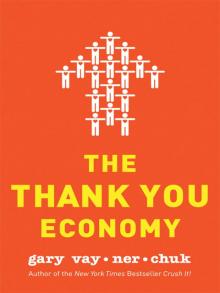 The Thank You Economy
The Thank You Economy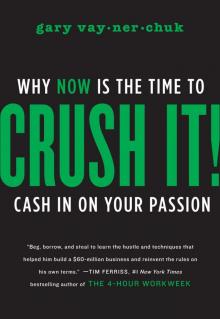 Crush It!
Crush It!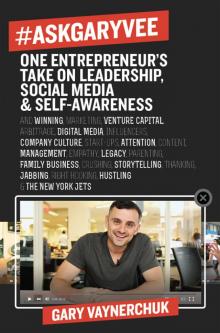 #AskGaryVee
#AskGaryVee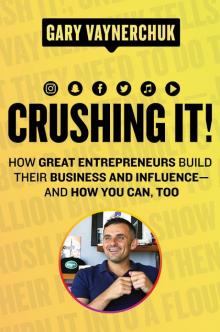 Crushing It! EPB
Crushing It! EPB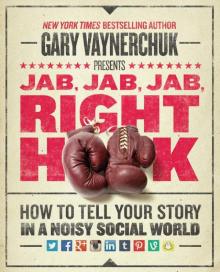 Jab, Jab, Jab, Right Hook
Jab, Jab, Jab, Right Hook